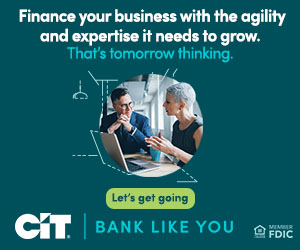- Exploring the Future of Supply Chain Finance: Insights from SFNet's Inaugural Conference
- Navigating 2025: SFNet’s Asset-Based Capital Conference Returns to Las Vegas with Premier Insights and Networking
- Siena Lending Group Announces Leadership Transition Plan
- Celebrating the Achievements of SFNet Chapters
- Checking in With Steven Meirink, CEO, Wolters Kluwer Financial & Corporate Compliance
Hitting Their Stride: Secured Finance Professionals Discuss Keys to Developing Confidence
By Angela Fiorentino

Pictured, left to right: Phyllis Young, partner, McGuireWoods LLP; Jan Bellah chief operating officer, Pay4Freight LLC; Jennifer Cann, senior vice president and head of the Retail Finance Group Portfolio, Bank of America, N.A.
What is it about some women that makes them seem fearless and unflappable? Here, we interview three women, Phyllis Young, partner, McGuireWoods LLP; Jan Bellah chief operating officer, Pay4Freight LLC; Jennifer Cann, senior vice president and head of the Retail Finance Group Portfolio, Bank of America, N.A. with very different careers in the financial industry who seem to have figured out the key to feeling and appearing confident and effective in the workplace.
In this article, we refer to a confident and effective presence as “hitting one’s stride.” Meriam Webster defines hitting one’s stride as “begin[ning] something in a confident and effective way after starting slowly.” Other definitions include “start[ing] to do something easily and confidently, after being slow and uncertain at the beginning.” No matter the precise definition, the common elements seem to be confidence after experiencing a slow start or uncertain environment. Indeed, the “slow start” element is something all of our interviewees experienced.
According to Phyllis Young, who is a partner with McGuireWoods LLP working in the financial sector, “[we all need to] realize that everyone was new in a position at one time and feeling uncertain.” Jennifer Cann, senior vice president with Bank of America agrees: “I think at some point in everyone’s career they have questioned [their abilities]” and generally lacked confidence.
According to Young, connecting with others in your industry can help alleviate some of the stress of being new. Also, according to Young, “Relationships are important – not just for obvious reasons like building client relationships – but also for feeling fulfilled both personally and professionally.” It seems that establishing relationships and seeking mentors can be a good outlet for sharing your uncertainties and collaborating with others on how to overcome these challenges. Even with all of her experience, Young reports that she still enjoys connecting with others who are new to the industry. So, she encourages women who are new to an industry to reach out to other more-established women. But, she cautions that women should not be discouraged if the person to whom they reach out does not have time to connect at that particular time and should continue to be purposeful in their follow-up and look for opportunities to connect over the long-term.
Cann notes that, “having a network of people to lean on for advice, suggestions and solutions is so valuable in building your career and maintaining meaningful relationships that you can rely on for years.” Jan Bellah, who is the chief operation officer for Pay4Freight agrees that personal connections are integral to feeling more comfortable and confident, “one of the keys to [professional] growth is seeking out people who I trust and respect for guidance.” Bellah adds that those in your inner circle should share your salient values and be of good character.
So, it seems that social connections can be helpful to accelerating growth and achieving confidence, but some of the most significant advice from our interviewees focused on one’s own internal mental fortitude. According to Bellah, you should seek to “improve your emotional intelligence. This gives you the ability to understand your own emotions and manage them in positive ways.” She also recommends practicing mindfulness and being careful not to continuously put unrealistic expectations on yourself.
For Young, getting over the fear of the potential negative impacts of your well-intentioned actions was key. Rather than worrying about whether the “hard” advice Young sometimes needed to give would be well-received, she considered that sometimes the difficult advice was the advice her clients most needed to hear. Rather than alienating her, her clients actually accepted the advice and sought more guidance from her. She believes this is because her clients trusted her to give them appropriate advice – even if that advice was hard for them to hear.
All of our interviewees seemed to view challenges and criticism as opportunities for growth, rather than as threats, indicating that one’s frame of reference may play an important role in professional growth. According to Bellah “If you look at challenges and obstacles as the next opportunity there is always something to gain.” Indeed, Young reports that “using feedback to grow rather than taking it personally is really important.” According to her, “women sometimes internalize constructive feedback. We also sometimes limit ourselves because we’re afraid of making mistakes or of not being liked. But with time and experience, we’re much less afraid of these things and [when you get there] it’s very freeing.” Cann adds that we need to embrace life’s twists, turns and roadblocks because “these changes can take you down different paths you never would have considered.”
For all of our interviewees, a big step toward hitting one’s stride was removing mental roadblocks about whether we’re good enough (we are) and trusting that confidence is a process through which we will eventually achieve success. For Young, that process involves setting career milestones and being willing to course-correct. For Cann, realizing that success can be measured in other ways was crucial to developing her confidence. For her, instincts, good judgement, and listening skills have all contributed immensely to her success. For Bellah, fearlessly pursuing one’s goals while staying grounded and mindful was crucial. As Bellah so aptly advises “get out of your own head and don’t ruminate.” In other words, relax and trust the process – you’ll hit your stride.



